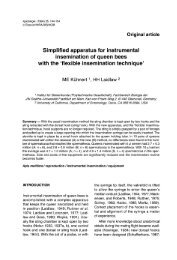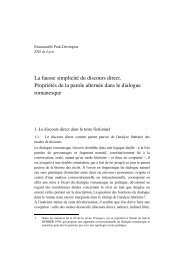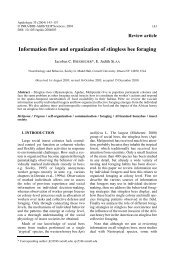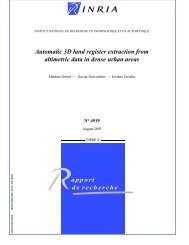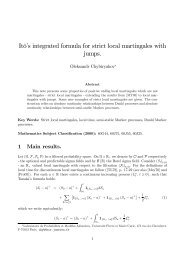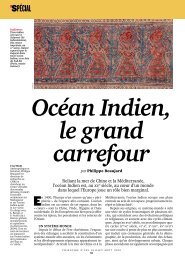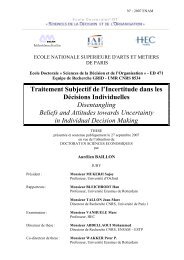Itineraries of Palestinian refugees: Kinship as resource in emigration.
Itineraries of Palestinian refugees: Kinship as resource in emigration.
Itineraries of Palestinian refugees: Kinship as resource in emigration.
You also want an ePaper? Increase the reach of your titles
YUMPU automatically turns print PDFs into web optimized ePapers that Google loves.
halshs-00342285, version 1 - 28 Nov 2008<br />
the situation became more difficult and he had to stop his trade activities <strong>as</strong> circulation<br />
w<strong>as</strong> gett<strong>in</strong>g very difficult. After a short st<strong>in</strong>t <strong>of</strong> unemployment, he re-opened a small shop<br />
sell<strong>in</strong>g leather goods. He managed to survive especially <strong>as</strong> a result <strong>of</strong> trade with Jordan.<br />
Dur<strong>in</strong>g the 1990s, the social and economic situation for <strong>Palest<strong>in</strong>ian</strong>s w<strong>as</strong> gett<strong>in</strong>g worse<br />
but he did not consider com<strong>in</strong>g back to Lebanon for the situation there w<strong>as</strong> even worse.<br />
In 2003, when the war began, he left Baghdad with his wife because it w<strong>as</strong> no longer<br />
safe. He first decided to go to Jordan, but the Jordanian border w<strong>as</strong> closed to <strong>refugees</strong>,<br />
and many <strong>Palest<strong>in</strong>ian</strong>s had been deta<strong>in</strong>ed at the border and were not allowed to enter<br />
(Doraï et al. 2003). After several attempts, he managed to cross the Syrian border and<br />
enter Lebanon.<br />
He returned to his family’s house <strong>in</strong> R<strong>as</strong>hidiyyeh, the only place he could reside.<br />
His wife, <strong>as</strong> a Jordanian citizen h<strong>as</strong> to pay annually for her residency permit. Because she<br />
does not have enough money she never leaves the refugee camp to avoid any police<br />
checkpo<strong>in</strong>ts. Together, they have opened, with the help <strong>of</strong> Ahmed’s family, a small shop<br />
where they sell fruits and vegetables. They lost all their money and <strong>as</strong>sets <strong>in</strong> Baghdad,<br />
and they receive no help from <strong>in</strong>ternational organizations nor from the Lebanese<br />
government. The only help he received came from his family who accommodated him.<br />
Here family solidarity is limited to accommodation, because political and legal<br />
constra<strong>in</strong>ts predom<strong>in</strong>ate.<br />
These two first c<strong>as</strong>e studies show clearly that the "return" to the first country <strong>of</strong><br />
<strong>as</strong>ylum (i.e. Lebanon) is due to the difficulty or the impossibility <strong>of</strong> stay<strong>in</strong>g <strong>in</strong> the country<br />
<strong>of</strong> <strong>emigration</strong> (i.e. Iraq) because <strong>of</strong> <strong>in</strong>security, war, or discrim<strong>in</strong>ation. "Return" is then the<br />
only viable solution and is perceived <strong>as</strong> a temporary option. They also show that at the<br />
<strong>in</strong>dividual level this migration can be considered <strong>as</strong> a "return" - <strong>Palest<strong>in</strong>ian</strong>s orig<strong>in</strong>ally<br />
from Lebanon com<strong>in</strong>g back <strong>in</strong> their first country <strong>of</strong> <strong>as</strong>ylum - but if one considers the<br />
household level, it can be considered <strong>as</strong> an <strong>emigration</strong> movement towards a new country<br />
<strong>of</strong> residence, due to marriage with non-<strong>Palest<strong>in</strong>ian</strong> women (i.e. Iraqi) or women com<strong>in</strong>g<br />
from another part <strong>of</strong> the Di<strong>as</strong>pora (i.e. Jordan).<br />
14


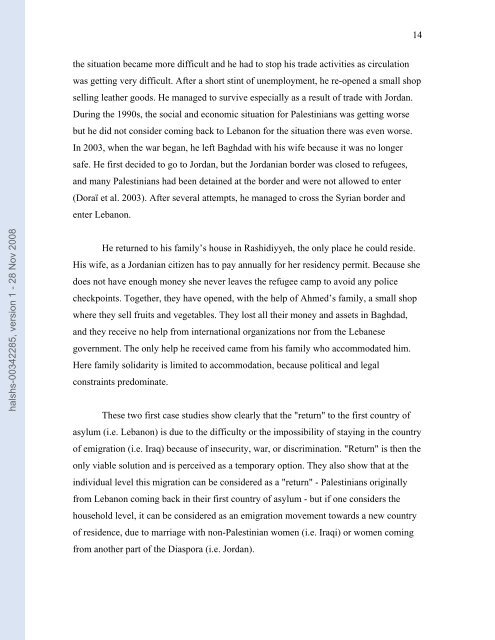
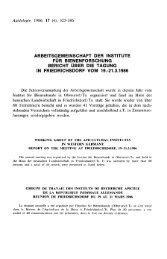
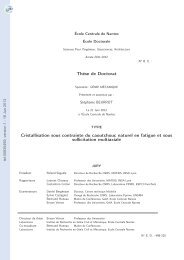
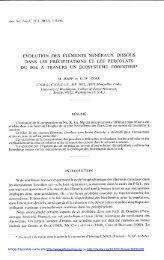
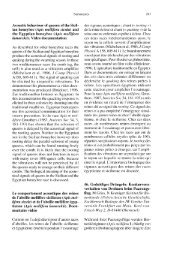
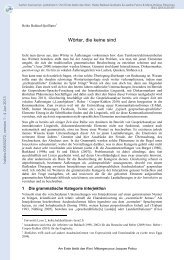
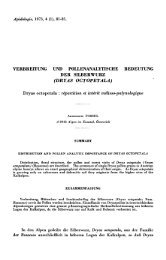
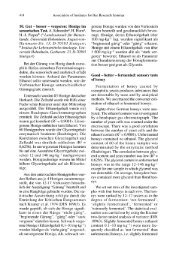
![4 C]-Polyethylenglykol bestimmt, der - HAL - INRIA](https://img.yumpu.com/22454280/1/177x260/4-c-polyethylenglykol-bestimmt-der-hal-inria.jpg?quality=85)
